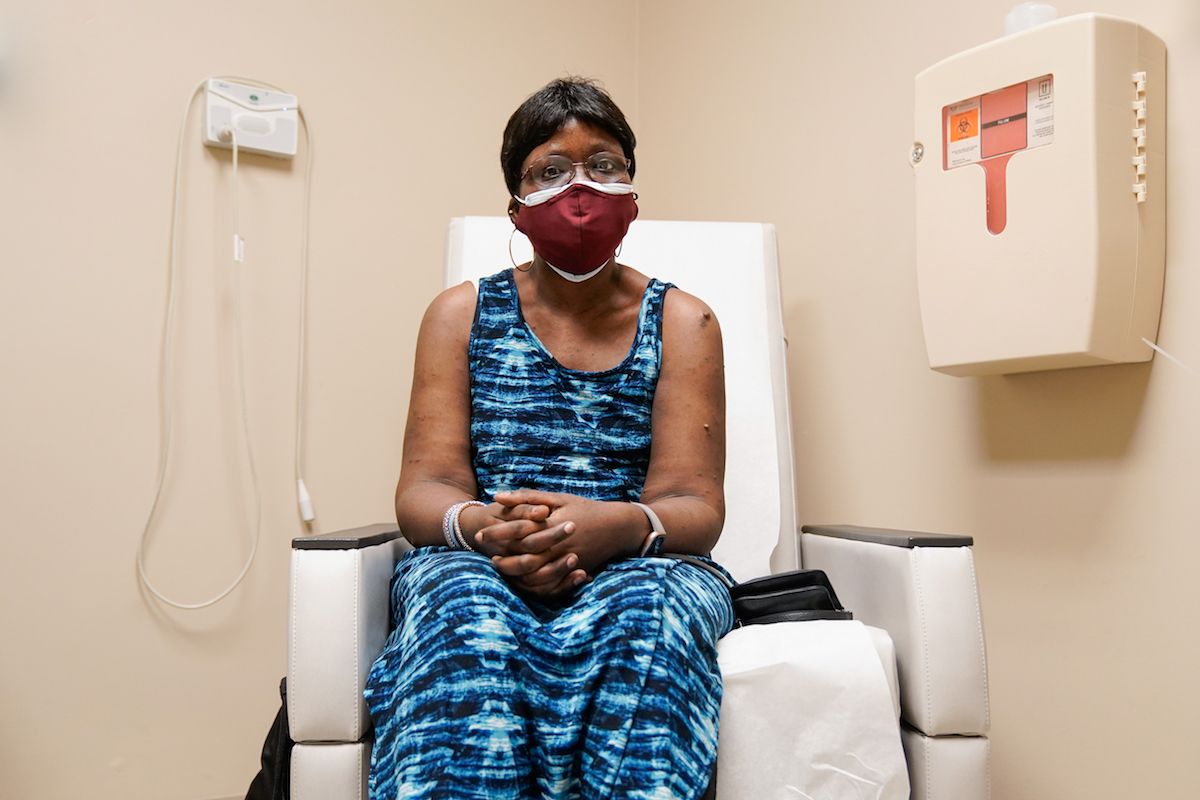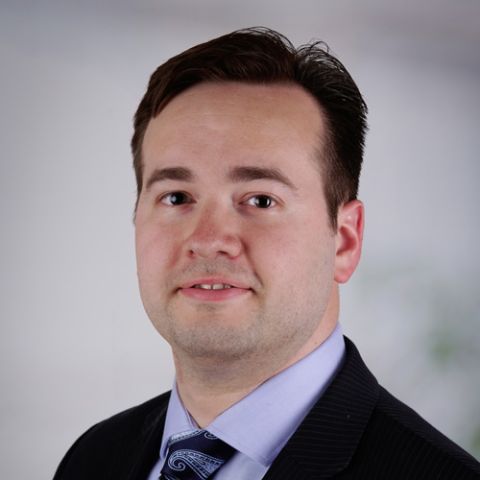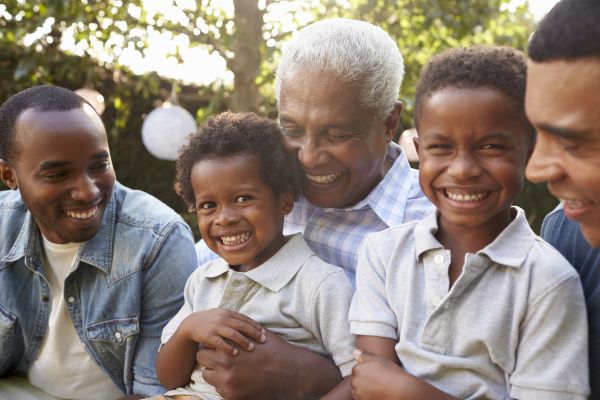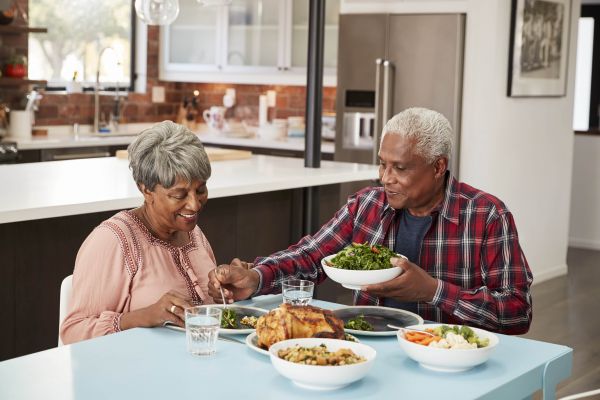New Roswell Park clinic offers expert care for rare genetic condition
According to some sources, the name Shamika means loving, kind and tranquil. Those who know Shamika Holloway know that she is all those things and more. She also embodies courage, grace and perseverance in her long journey with neurofibromatosis (NF), a disease that, until a visit to Roswell Park, remained undiagnosed and untreated for more than 15 years.
Neurofibromatosis is an inherited genetic condition that leads to the development of nerve tissue tumors in several body areas. There are two distinct types of neurofibromatosis: NF1 and NF2-related schwannomatosis. Because the tumors caused by neurofibromatosis can cause many different types of symptoms, often it takes several years and consultations with many different specialists before the disease is properly diagnosed and managed.
Now, thanks to a new clinic at Roswell Park, adult NF patients like Shamika finally have a place for streamlined, coordinated neurofibromatosis care, with specialists in tumor biology, neurology, neurosurgery, sarcoma oncology, sarcoma surgery, plastic surgery, pain management and genetics — all at one location. While the tumors caused by neurofibromatosis are usually nonmalignant (not cancer), they can cause significant harm, and some do progress to cancer. Ongoing imaging, monitoring and timely treatment are important.
“We take a comprehensive approach, looking at the big picture of what it means to have neurofibromatosis, and managing issues specific to NF while also monitoring a patient’s health as a whole person,” says neurosurgeon Lindsay Lipinski, MD, who oversees the clinic. In February 2021, Shamika was one of the first patients to attend the new clinic and met with several members of Roswell Park's NF team.
An elusive diagnosis
Although Shamika was born with the condition, symptoms didn’t begin to appear until she was in her teens, when she noticed skin growths on her arms and legs. “The bumps itched, but otherwise they didn’t bother me too much at the time,” she recalls. But in her mid-20s, those “bumps” started to bother her more. “I went to a lot of different doctors, and some of the bumps were biopsied, but I never got a really good answer about what they were, what caused them, or if they were dangerous,” Shamika says.
Meanwhile, Shamika completed college and eventually got a job she loved, as a preschool teacher. “I adore working with little kids. They may only be three or four years old, but they are little people with their own personalities, and you need to treat them with respect,” she says.
But in late 2019, at age 31, one of the bumps became bothersome. “It started to grow and become painful, both on the inside and outside of my leg,” Shamika recalls. “My doctor referred me to an orthopedic oncologist at Roswell Park, and I had a biopsy and imaging done on the tumor.” Joseph Kuechle, MD, determined that the tumor was a malignant peripheral nerve sheath tumor (MPNST), a rare kind of tumor that is common in young and middle-aged adults with neurofibromatosis 1(NF1). “So, after having those bumps for more than 15 years, I finally learned the name for what I had,” Shamika says.
Treatment requires several specialists
Shamika began chemotherapy and radiation to shrink the large tumor. “I lost my hair and appetite, had a lot of nausea, and I needed to take a leave my from job,” Shamika recalls. “It broke my heart, but I figured it would only be temporary.”
Unfortunately, that was not the case. Drs. Kuechle determined that Shamika needed to have the tumor completely removed from her leg, and surgery was scheduled for April 2020 — just as COVID-19 caused major shutdowns in the United States. Without tears or anger, Shamika recalls a very tough week of recovery at Roswell Park, with no visitors allowed due to COVID restrictions, but also under the care of the extremely compassionate Roswell Park staff.
Due to the pandemic, “the only place I went was to Roswell Park for treatments and checkups,” Shamika says. Although transportation to and from her appointments became a hardship, she was put in touch with Bethann Levin, LMSW, a social worker on the NF team at Roswell Park, who helped arrange transportation for her.
Neurofibromatosis Care
Get more information about the neurofibromatosis clinic at Roswell Park.
Later in the year, Shamika developed respiratory issues and underwent thoracic bronchial debulking, performed by interventional pulmonologist Nathaniel Ivanick, MD, to remove tumors in her airways. Under the care of thoracic surgeon Todd Demmy, MD, FACS, she also took part in a clinical trial involving lung suffusion, a procedure developed at Roswell Park to safely deliver high-dose chemotherapy to the lung. Soon Shamika will undergo a full-body MRI to detect and monitor any other tumors, and because women with NF have a higher risk for breast cancer, she’ll also have an appointment at the High Risk Breast Cancer Clinic.
While attending the NF Clinic in February 2021, Shamika met with former Roswell Park medical geneticist Joseph Maher, MD. “I had genetic testing, and I’ve since learned that the NF gene was carried by my biological father’s family,” Shamika says. She also received help from pain management specialist Ivan Cohen, MD, to help control the pain in her leg, and attended a survivorship workshop, via Zoom, hosted by Roswell Park’s Survivorship Center.
While she admits to being scared, Shamika’s grace again shines through as she looks toward the future. “I try to keep my spirits high, and I am so grateful for my grandma, all of my family and friends, and my doctors and nurses at Roswell Park who have done so much to help me these last few years.”
Sadly, since the posting of this blog, Shamika lost her battle with cancer, but her family would like her memory to live on through this story as a source of inspiration and information to others.
Editor’s Note: Cancer patient outcomes and experiences may vary, even for those with the same type of cancer. An individual patient’s story should not be used as a prediction of how another patient will respond to treatment. Roswell Park is transparent about the survival rates of our patients as compared to national standards, and provides this information, when available, within the cancer type sections of this website.



